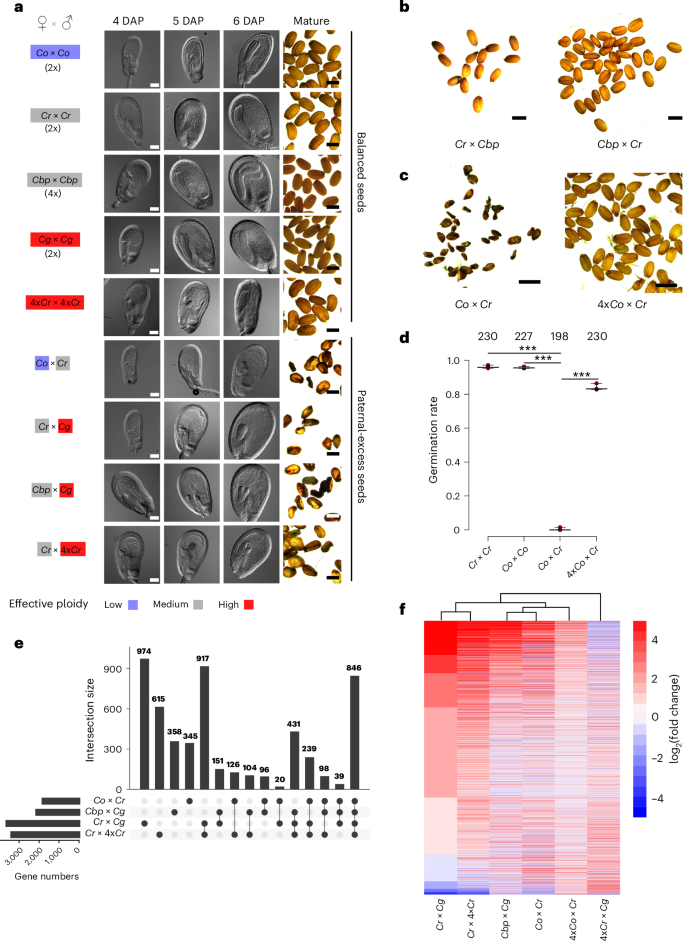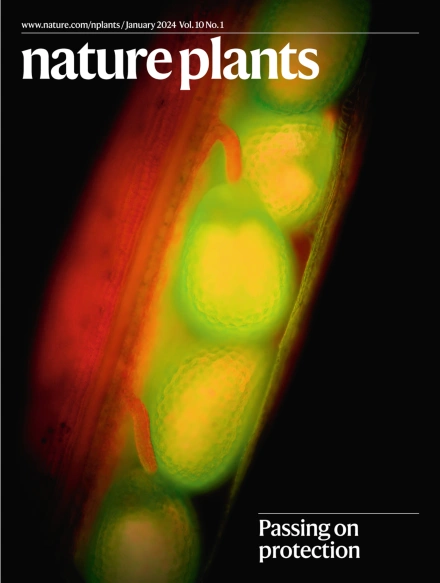剂量敏感的母体 siRNA 决定了毛壳菌的杂交成功率
IF 15.8
1区 生物学
Q1 PLANT SCIENCES
引用次数: 0
摘要
植物物种间的广泛杂交导致的杂交种子失败是植物育种中经常出现的障碍,阻碍了理想性状的传递。这种杂交后的生殖障碍主要发生在胚乳中,胚乳是滋养胚胎的组织,其功能类似于哺乳动物的胎盘。我们发现,不相容种子的胚乳中出现了 DNA 甲基化和染色质凝集的损失,这与缺乏母体 RNA 聚合酶 IV 活性的种子类似。这种相似性与胚乳中小干扰 RNA(sirenRNAs)的减少有关,后者是依赖于母体 RNA 聚合酶 IV 的短干扰 RNA,可调节 DNA 甲基化。一些类似 AGAMOUS 的 MADS-box 转录因子基因(AGLs)是胚乳发育的关键调控因子,它们在顺式和反式中都是 sirenRNAs 的靶标。这一发现与 AGL 靶基因在失调基因中的富集一致。我们认为,杂交种子失效的原因是母本 sirenRNAs 减少,加上 AGL 表达增加,导致胚乳中的基因调控异常。本文章由计算机程序翻译,如有差异,请以英文原文为准。


Dosage-sensitive maternal siRNAs determine hybridization success in Capsella
Hybrid seed failure arising from wide crosses between plant species is a recurring obstacle in plant breeding, impeding the transfer of desirable traits. This postzygotic reproductive barrier primarily occurs in the endosperm, a tissue that nourishes the embryo and functions similarly to the placenta in mammals. We found that incompatible seeds show a loss of DNA methylation and chromatin condensation in the endosperm, similar to seeds lacking maternal RNA polymerase IV activity. This similarity is linked to a decrease in small interfering RNAs in the endosperm (sirenRNAs), maternal RNA polymerase IV-dependent short interfering RNAs that regulate DNA methylation. Several AGAMOUS-like MADS-box transcription factor genes (AGLs), key regulators of endosperm development, are targeted by sirenRNAs in cis and in trans. This finding aligns with the enrichment of AGL target genes among deregulated genes. We propose that hybrid seed failure results from reduced maternal sirenRNAs combined with increased AGL expression, leading to abnormal gene regulation in the endosperm. Hybrid seed failure in plant breeding arises from disrupted endosperm development. Reduced maternal sirenRNAs and increased expression of AGL transcription factors cause abnormal gene regulation in the endosperm, preventing successful wide species crosses.
求助全文
通过发布文献求助,成功后即可免费获取论文全文。
去求助
来源期刊

Nature Plants
PLANT SCIENCES-
CiteScore
25.30
自引率
2.20%
发文量
196
期刊介绍:
Nature Plants is an online-only, monthly journal publishing the best research on plants — from their evolution, development, metabolism and environmental interactions to their societal significance.
 求助内容:
求助内容: 应助结果提醒方式:
应助结果提醒方式:


